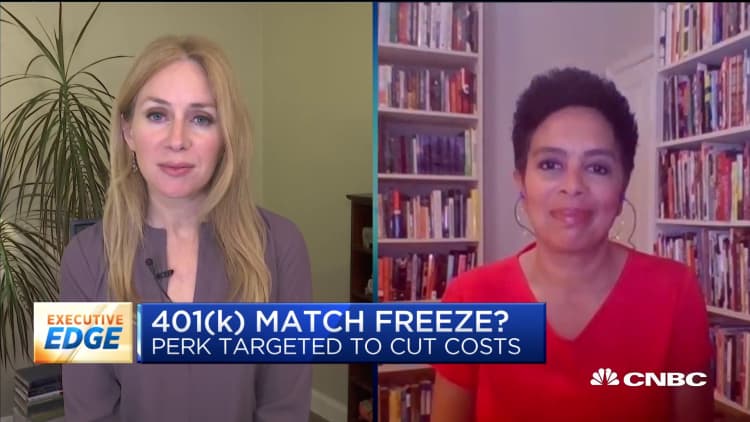On Saturday the IRS started depositing $1,200 payments into eligible tax filers' bank accounts as part of the relief efforts of the $2 trillion stimulus bill, known as the CARES Act, which was signed into law in late March.
Tax filers with adjusted gross income up to $75,000 for individuals and up to $150,000 for married couples filing joint returns will receive the full $1,200 (or $2,400 for couples) payment. For filers with income above those amounts, the payments will be reduced and then phased out for individuals whose income exceeds $99,000 (or $198,000 for married couples filing jointly). Parents may also receive $500 for each qualifying child under age 17.
Seniors, Social Security recipients and railroad retirees who are not required to file a tax return and did not file a 2018 or 2019 return may still be eligible for a $1,200 payment based on the information on their SSA-1099 or RRB-1099 forms outlining their benefits that the IRS has already received. Go to the IRS website to learn more about who is eligible.

Many Americans still have questions
Managing your money in the middle of a pandemic is an unprecedented dilemma. Millions of Americans are facing a great deal of uncertainty about their job, monthly income, daily expenses, debts, retirement and cash savings.
Many people across the U.S. are questioning how to ensure they will get a relief check and other government benefits. Others wonder if the advice to "stay the course" when markets are so volatile applies to everyone, even those who are close to retirement.
I spoke with financial and tax experts about your most pressing concerns — and got you the answers you asked for.
I have not filed my 2019 taxes yet, and most years I owe money. So my bank information is not on file with the IRS. I read a couple weeks ago that the federal government was going to create a website for Americans to go and input their direct deposit info with the IRS. Has this happened yet? And if not, is the website still coming, and when? I cannot wait 20 months for the relief check.
It's smart to get your bank account information to the IRS as soon as possible. The IRS said it started depositing economic impact payments into taxpayers' bank accounts on April 11 and it "will continue issuing them as fast as we can." The IRS and Treasury Department have set up two websites. One for people who aren't required to file taxes, so they can simply enter payment information to receive their stimulus check. The other website, called "Get My Payment," instructs you to enter your bank account information for direct deposit if the IRS doesn't have your direct deposit information and has not sent your payment yet. The IRS says this option will be live on its website by April 17.
Having direct deposit is the fastest way to get your stimulus payment. Otherwise, it could take up to five months for checks to be mailed.
The current backlog for processing claims is three to five weeks. The CARES Act bumped up unemployment, but it doesn't do any good if a state cannot process the claims. How are people to survive?
Roughly 16 million Americans have filed unemployment claims in the past three weeks. While the Labor Department says it generally takes two to three weeks after you file your claim to get your first check, this can differ from state to state and may be delayed due to the surge in volume of people filing for jobless benefits.
Surviving a layoff means coming up with cash to cover your immediate needs, including monthly bills, such as rent, mortgage and utilities.
First, reach out to your landlord, mortgage lender or bank and utility company to see what payment leniency they may be offering. Several lenders, for example, are allowing borrowers to delay mortgage payments for up to three months.
Next, figure out where you can free up some cash — your emergency fund, Roth IRA or maybe a hardship withdrawal from your 401(k). Ideally, you have an emergency fund to tap into, but realistically very few Americans have even a few dollars saved. If you've invested retirement savings in a Roth IRA, your contributions are always yours to take out at any time penalty-free and tax-free. Under the CARES Act, you can also take a hardship withdrawal of up to $100,000 from your 401(k) without paying the 10% early withdrawal penalty if you're under age 59 ½. However, you will have to pay ordinary income taxes on that withdrawal.

Finally, if you have to borrow, check out rates on personal loans. These loans can range from $10,000 to more than $20,000 on average, according to LendingTree, with a typical term of three to five years. In March the best APR for borrowers with a credit score of 760 or above was just under 10%, compared to over 18% for someone with a score of 680–719, LendingTree found. The better your credit score, the lower your rate.
More from Invest in You:
Which bills to pay during the coronavirus pandemic
7 saving habits for the coronavirus quarantine that should carry you through 2020
Here's exactly what you need to do if you lose your job
When my husband and I filed taxes 2018, we claimed our adult children and at this time our income will not count for the stimulus money. But we sent our taxes to our accountant last week to try and file asap for 2019, since our income has changed. Our two adult children that live with us filed separately, so they should now qualify to receive their stimulus checks. Will the government use the 2019 taxes? How long do we have for our accountant to file to use 2019 before they are issuing checks?
As of Friday, the IRS said if you have already filed your tax returns this year for 2019, the agency will use this information to calculate the payment amount. If you haven't filed yet for 2019 but filed a 2018 federal tax return, the IRS will use the information from your 2018 tax filings to make the economic income payment calculations.
The IRS started to directly deposit these payments into tax filers' accounts on Saturday, April 11. If your 2019 tax return hasn't yet been filed, your accountant should do so as soon as possible.
I have heard finance experts address those concerned with making contributions to 401(k) at this time remark, "If there is time, then stay in." I have not heard what to do if you are 62, 65 or 68 and still working and not taking any payouts. Do we continue to contribute also?
Yes, while each person's situation is different, most financial advisors would agree that even those who are near retirement should continue to contribute to their 401(k) if they can.
Take this time to review your cash flow and emergency savings to make sure that you have enough money stashed away to cover six to 12 months of living expenses. If you are still employed, believe your income is relatively stable and have little debt, then you should continue to focus on contributing to your 401(k) at least up to the company's matching contribution and max out if you can.
If you have extra cash, many financial advisors say now is the time to buy stocks and invest in stock mutual funds and exchange traded funds while prices are low.
If you have extra cash, many financial advisors say now is the time to buy stocks and invest in stock mutual funds and exchange traded funds while prices are low.
Review and rebalance the investments in your 401(k) or other portfolios. "Assuming there have been no major changes in your life, your portfolio may still be positioned where you need it to be," said financial advisor Diahann Lassus of Lassus Wherley in a recent newsletter to clients. "If your portfolio hasn't been rebalanced since this volatility started, you are probably underweight equity. This means it may be time to sell some of the U.S. fixed income and add to the equity side of the portfolio."
Even if you are in your 60s, you still have time for your retirement money to grow. Once you stop working, you may be retired for several decades. Investments that historically perform best over time are stocks, which can be risky. But the advice to "stay the course" is valid if you have five, 10 or 20 years or more to ride out the ups and downs of the market.
SIGN UP: Money 101 is an 8-week learning course to financial freedom, delivered weekly to your inbox.
CHECK OUT: How to get your coronavirus stimulus check ASAP, according to tax experts via Grow with Acorns+CNBC.
Disclosure: NBCUniversal and Comcast Ventures are investors in Acorns.






